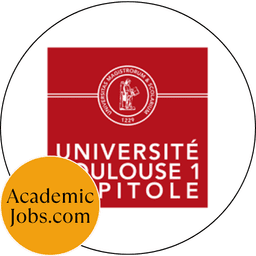Higher Education Jobs in Occitanie
Occitanie offers vibrant academic opportunities, with leading institutions driving innovation in fields like biotechnology, aerospace, and humanities. The region, located in southern France, is home to a dynamic academic community that attracts talent from across the globe. Whether you're seeking professor positions in Occitanie or research jobs in Occitanie, this region provides a rich environment for higher education jobs in Occitanie. Discover professor ratings through Rate My Professor to make informed career decisions.
With a blend of historic campuses and cutting-edge research facilities, Occitanie is a hub for academic careers in Occitanie. Explore careers and resources tailored to the region at AcademicJobs.com, your go-to platform for faculty jobs in Occitanie and beyond.
Top Universities in Occitanie:
Faculty Job Opportunities in Occitanie
Pursue rewarding careers in Occitanie with roles such as Assistant Professor, Lecturer, and Research Fellow. The region is known for high-demand positions in aerospace engineering, health sciences, and digital technologies, reflecting its strong ties to industry. Salaries for faculty jobs in Occitanie typically range from €30,000 to €70,000 annually, depending on role, experience, and institution. Tenure-track positions are competitive but offer long-term stability and research funding opportunities.
Occitanie's academic institutions prioritize innovation, with many roles focusing on interdisciplinary projects. For instance, faculty at renowned universities often collaborate with local industries like Airbus in Toulouse. Whether you're exploring lecturer roles in Occitanie or research jobs in Occitanie, AcademicJobs.com provides tailored listings to match your expertise. Start your journey by visiting Occitanie job listings and uncover the best faculty positions in Occitanie.
The demand for academic talent in Occitanie continues to grow, especially in STEM fields and sustainable development. With a supportive academic network and access to European research grants, this region is ideal for building a career. Check out opportunities at Faculty Positions and Research Jobs on AcademicJobs.com to find your next role.
Why Pursue a Career in Occitanie Academia
Academic careers in Occitanie offer a unique blend of intellectual stimulation and cultural richness. The region is a powerhouse for research in aerospace, biotechnology, and environmental sciences, providing ample opportunities for impactful work. Faculty members benefit from proximity to industry giants like Airbus and access to European funding programs, making Occitanie a strategic location for academic growth. Additionally, the region's vibrant cultural heritage, from medieval towns to modern cities, enhances the appeal of working here.
Beyond professional advantages, Occitanie offers a high quality of life with its Mediterranean climate and scenic landscapes, ideal for work-life balance. Explore academic opportunities in Occitanie at AcademicJobs.com and take the first step toward a fulfilling career.
Salary Guide for Faculty in Occitanie
Faculty salaries in Occitanie vary by role, institution, and experience level. Based on recent data, Assistant Professors earn between €30,000 and €40,000 per year, while Associate Professors can expect €40,000 to €55,000 annually. Full Professors often command salaries ranging from €55,000 to €70,000 or higher, particularly at prestigious institutions or with significant research contributions. These figures are influenced by factors such as cost of living, which is moderate compared to Paris, and institutional funding.
Public universities in France, including those in Occitanie, often adhere to national salary scales, but private institutions or specialized research centers may offer higher compensation. Additional benefits like research grants, housing allowances, and sabbatical opportunities can enhance overall earnings. For academics relocating to Occitanie, understanding these salary ranges is crucial for financial planning. 📊
Location within Occitanie also plays a role—urban centers like Toulouse may offer higher pay due to demand, while rural campuses might provide other perks like lower living costs. For more detailed insights on faculty salaries in Occitanie, explore resources at Professor Salaries on AcademicJobs.com. Whether you're starting as a lecturer or aiming for a department chair role, understanding salary trends in Occitanie academia is key to career planning.
Weather and Climate in Occitanie
Occitanie enjoys a Mediterranean climate in much of the region, with mild winters and warm, sunny summers. Average temperatures range from 5°C to 15°C in winter (December to February) and 20°C to 30°C in summer (June to August). Coastal areas near Montpellier experience more temperate weather, while inland regions like Toulouse can see slightly cooler winters and hotter summers. Rainfall is moderate, with wetter months in spring and autumn, making outdoor activities feasible year-round. ☀️
This pleasant climate positively impacts academic life in Occitanie. Mild weather allows for outdoor lectures, campus events, and networking in natural settings like the Pyrenees or Mediterranean beaches during breaks. However, summer heatwaves can occasionally disrupt schedules, so air-conditioned facilities are a must on campuses. For newcomers, spring and autumn are ideal times for campus visits or relocations due to comfortable temperatures and fewer crowds.
The weather also influences lifestyle choices for academics—many enjoy hiking, cycling, or seaside retreats as stress relievers. Understanding seasonal patterns helps in planning academic calendars and personal activities. For those considering a move, Occitanie's climate offers a refreshing change from harsher northern European winters, enhancing the appeal of academic careers in Occitanie.
Work Environments in Occitanie Universities
Work environments in Occitanie universities are characterized by a collaborative and innovative culture. Institutions prioritize interdisciplinary research, often partnering with local industries like aerospace and tech in Toulouse. Campuses are equipped with modern facilities, including state-of-the-art labs and libraries, fostering a productive atmosphere for faculty and researchers. Many universities also embrace hybrid work models, allowing flexibility for lectures and research activities.
Diversity and inclusion are key focuses, with initiatives to support international faculty and gender equity in hiring. Employee satisfaction is generally high, thanks to supportive policies like sabbaticals and professional development funding. Work-life balance is encouraged, with access to cultural events and natural landscapes like the Pyrenees for relaxation. Faculty in Occitanie often report a strong sense of community, with regular academic conferences and networking opportunities enhancing collaboration.
Urban campuses in Toulouse and Montpellier offer vibrant, fast-paced environments, while smaller institutions provide a quieter, more focused setting. Whether you're drawn to the buzz of city life or the calm of rural areas, Occitanie's academic institutions cater to varied preferences. Explore work environments further through Academic Career Advice on AcademicJobs.com.
Lifestyle and Cost of Living in Occitanie
Occitanie offers a high quality of life with a cost of living that is generally more affordable than in Paris. Average monthly rent for a one-bedroom apartment in city centers like Toulouse or Montpellier ranges from €600 to €900, while outside urban areas, it drops to €400-€600. Groceries and transportation are reasonably priced, with a monthly public transport pass costing around €50. Compared to national averages, Occitanie provides a cost-effective lifestyle for academics and their families.
The region is rich in cultural attractions, from historic sites like Carcassonne to vibrant festivals in Montpellier. Dining options range from traditional French cuisine to international flavors, with a meal at a mid-range restaurant costing €25-€40. Recreational activities abound, with access to the Mediterranean coast, Pyrenees mountains, and numerous vineyards for weekend getaways. This blend of urban and rural lifestyles makes Occitanie appealing for academics seeking balance.
For faculty, the region's lifestyle supports both professional and personal growth. Proximity to cultural hubs and natural landscapes fosters inspiration, while affordable living costs ease financial stress. Whether you're exploring academic opportunities in Occitanie or relocating, the region's charm is undeniable. Learn more about balancing career and lifestyle at AcademicJobs.com.
Rate My Professor: Top Educators in Occitanie
Find and rate top educators in Occitanie with Rate My Professor on AcademicJobs.com. This platform helps students and academics identify exceptional professors based on real feedback. Whether you're choosing courses or seeking mentorship, professor ratings in Occitanie provide valuable insights into teaching styles and expertise.
Career Progression in Occitanie Academia
Career paths in Occitanie academia typically follow a structured progression from Assistant Professor to Associate and Full Professor roles. Tenure-track positions are competitive, often requiring a strong publication record and teaching excellence. Research funding is accessible through national and European grants, particularly in fields like aerospace and sustainability, which are regional strengths. Faculty can also pursue leadership roles such as Department Chairs or Deans, with opportunities listed at Department Chairs on AcademicJobs.com.
Research and Trends in Occitanie Higher Education
Occitanie is at the forefront of research in aerospace, biotechnology, and environmental sciences. Universities collaborate with industry leaders like Airbus and host numerous research centers focused on innovation. Trends include a growing emphasis on sustainable development and digital transformation, with funding opportunities from European programs. Faculty and researchers in Occitanie are well-positioned to lead impactful projects that address global challenges.
Resources for Occitanie Academics
- Professional associations like the French National Research Agency (ANR) offer funding and networking. 🎓
- Academic conferences in Toulouse and Montpellier provide platforms for collaboration. 💼
- Access journals and publications through university libraries or online portals. 📚
- Professional development costs average €500-€1,000 annually, often subsidized by institutions. 📊
Student Perspectives in Occitanie Higher Education
Students in Occitanie benefit from diverse programs in engineering, arts, and sciences. Choosing the right professor is crucial, and Rate My Professor on AcademicJobs.com offers insights into teaching quality. The region's climate and lifestyle also enhance student life, with affordable housing and cultural events enriching the academic experience.












%20Jobs.png&w=256&q=75)












.png&w=256&q=75)
.png&w=256&q=75)



